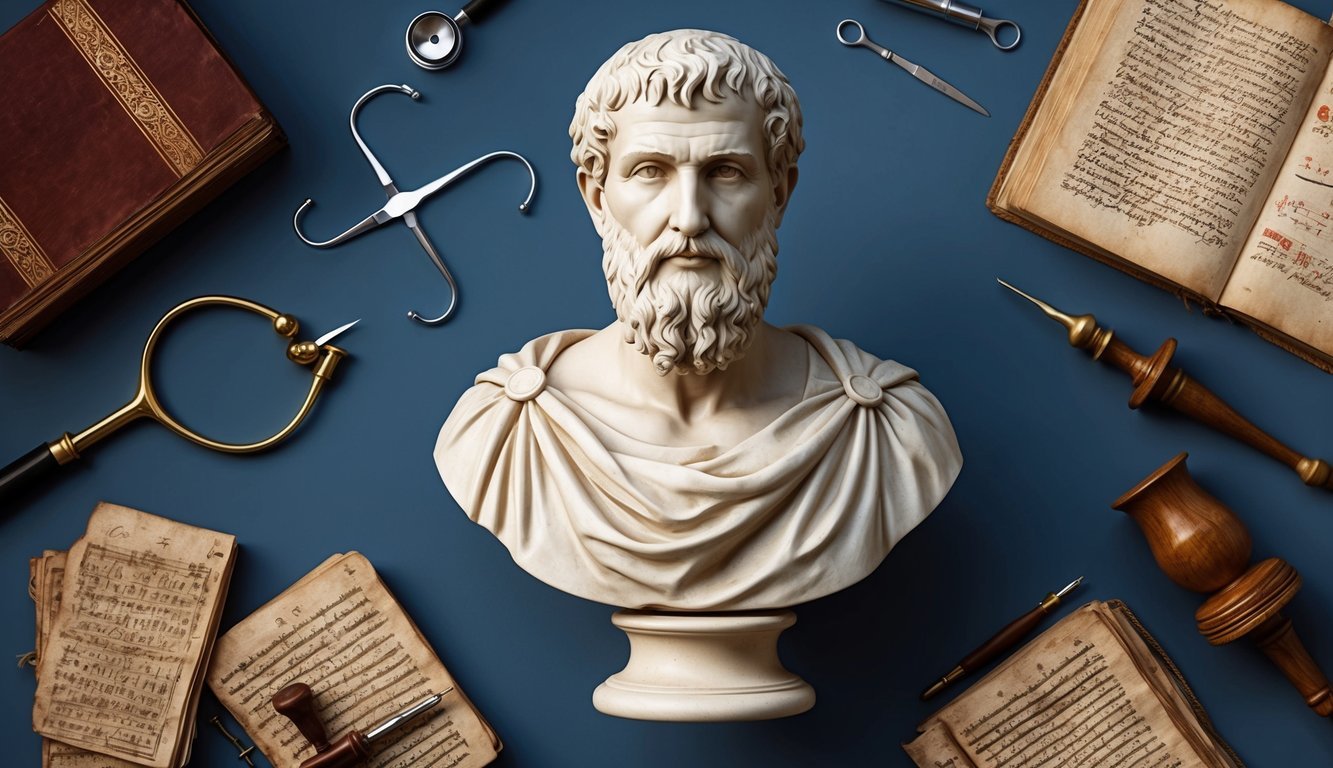Hippocrates, often called the father of medicine, was born around 460 BCE on the island of Cos.
His contributions laid the groundwork for the practice of medicine as we know it today.
Hippocrates founded a medical school and wrote many important texts, which offered insights into diseases and their treatments.
His most famous legacy is the Hippocratic Oath, a set of ethical guidelines for doctors that still influences medical practice worldwide.

His life remains somewhat of a mystery due to the lack of concrete historical records.
Historians rely on later writings to piece together his biography.
Despite this, his impact on medicine is undeniable.
Through careful observation and a systematic approach, he revolutionized the way health was understood, moving away from superstition and towards evidence-based practice.
Hippocrates’ work emphasized the importance of professionalism in medicine.
His teachings encourage patience and ethics, making him a pivotal figure for future generations of physicians.
Understanding who Hippocrates was helps to appreciate the significant strides in health care he inspired and the lasting effects of his principles on today’s medical ethics.
Early Life and Background
Hippocrates of Kos was born into a world shaped by ancient Greek culture and traditions.
His early life set the stage for him to become a key figure in medicine.
Factors like his family background and education played a significant role in his development.
Birth and Family Origin
Hippocrates was born around 460 BCE on the island of Kos, Greece.
He came from the Asclepiad family, known for their long history in medicine.
This family lineage traced back to Asclepius, the Greek god of healing.
His father, Heraclides, was a physician, which suggests that Hippocrates grew up immersed in the medical field from an early age.
Growing up in such an environment likely influenced his choice to pursue medicine.
The island of Kos was also known for its schools of philosophy and healing, which contributed to the intellectual atmosphere that surrounded him.
Asclepiad Tradition
Being part of the Asclepiad lineage, Hippocrates followed a tradition that included a deep respect for the art of healing.
This tradition emphasized natural remedies and holistic care, focusing on the balance of the body and mind.
Asclepiad physicians often practiced in temples dedicated to Asclepius, where healing rituals took place.
This background provided Hippocrates with valuable insights into patient care and the importance of observation.
He learned to approach medicine as a science rather than solely relying on spiritual practices or superstitions.
The traditions of his ancestors helped shape his views on health and treatment.
Education and Training
Hippocrates likely received his early education in medicine from family members and local physicians.
He absorbed medical teachings while also studying philosophy and ethics.
Many historians believe he may have traveled to different parts of Greece and beyond to learn from other medical practitioners.
This exposure to various methods of treatment improved his skills.
His training was not just about theory; it involved hands-on experience with patients.
This practical education laid the foundation for his innovative approach to medicine, which focused on diagnosis and prognosis, setting a standard for future generations.
Medical Philosophy and Practice
Hippocrates’ contributions to medical philosophy and practice shaped the foundations of modern medicine.
He emphasized natural healing, lifestyle changes, and the body’s balance, which guided his methods and theories.
Hippocratic Theory
Hippocratic theory stressed the importance of understanding the body as a whole.
He believed that health depends on a balance among various bodily components.
Treatments were tailored to individual patients, considering their unique symptoms and conditions.
Additionally, Hippocrates focused on the healing power of nature.
He encouraged rest, diet changes, and exercise as part of recovery, rather than relying solely on medicinal remedies.
This holistic view remains influential in today’s approaches to medicine, emphasizing lifestyle choices in maintaining health.
The Four Humors
Central to Hippocratic medicine was the theory of the four humors: blood, phlegm, yellow bile, and black bile.
Each humor was associated with different qualities—hot, cold, wet, and dry.
An imbalance among these humors was thought to lead to disease.
Treatment aimed to restore balance through diet, exercise, and sometimes bleeding.
For example, excess blood could be treated by reducing it through bloodletting.
This understanding influenced medical practices for centuries, directing attention to the way bodily fluids affect health.
Approach to Diagnosis and Prognosis
Hippocrates set a precedent for diagnosing illnesses through careful observation.
He emphasized recording symptoms, dietary habits, and lifestyle factors.
This information helped in understanding the patient’s condition.
Prognosis was equally important; Hippocrates believed that predicting the course of a disease could guide treatment decisions.
By combining observation with knowledge of illnesses, he was among the first to approach patient care systematically.
His methods fostered a relationship between patients and doctors that still informs medical practice today.
Key Contributions and Works

Hippocrates made many important contributions to medicine that shaped how it is practiced today.
His works included a mix of theories, observations, and ethical guidelines.
These laid the groundwork for future medical practice.
Hippocratic Corpus
The Hippocratic Corpus is a collection of texts attributed to Hippocrates and his followers.
This diverse set of writings covers various medical topics, including surgery, diet, and diagnosis.
Some key texts address important subjects like epidemics and the understanding of the sacred disease (epilepsy).
The physicians of the Hippocratic school emphasized observing patients and recording symptoms, which was a big shift from relying on supernatural explanations for illnesses.
This method of careful observation still influences medicine today.
Notable Medical Texts
Among the notable texts in the Hippocratic Corpus, the Aphorisms stand out.
They contain general rules about health and illness, guiding doctors in practice.
Another important work is On Airt, Waters, and Places, which discusses how environment affects health.
These texts help explain how diet and lifestyle impact well-being.
The writings often highlighted the need for a balanced approach in medical treatment—considering the whole patient instead of focusing solely on symptoms.
Influence on Future Generations
Hippocrates set important ethical standards that many physicians follow today.
The Hippocratic Oath, originating from his teachings, emphasizes the importance of ethics in medicine.
It stresses principles such as confidentiality and non-maleficence, meaning “do no harm.” This has guided physicians for centuries, shaping the practice of medicine in profound ways.
His impact can be seen in modern medical education, where ethics and empathy remain vital components in training future doctors.
Legacy and Impact
Hippocrates left a lasting mark on medicine and ethics, shaping how healthcare is viewed and practiced today.
His work continues to influence modern medical practices and the way physicians approach their duties.
The Hippocratic Oath
The Hippocratic Oath is one of his most significant contributions to the medical field.
It serves as a pledge for doctors to uphold ethical standards in their practice.
This oath emphasizes values like patient care, confidentiality, and non-maleficence.
Despite its ancient roots, the Oath has been adapted over time. Modern versions still reflect the commitment to ethics that Hippocrates championed.
Many medical schools require students to take this oath upon graduation, reinforcing the importance of ethical behavior in the medical profession.
Reputation Through History
Hippocrates gained a reputation as the “Father of Medicine” for his systematic approach to medicine.
His ideas set him apart from earlier thinkers like Aristotle and Plato, who often mixed philosophy with medicine.
Ancient historians, such as Galen, often referenced Hippocrates and his teachings.
They viewed him as a guiding figure, essential to the development of medical knowledge.
Over the centuries, his reputation led to the rise of many myths and stories about his life and work.
This blend of fact and fiction helped cement Hippocrates’ status as a legendary figure in history.
His influence is still acknowledged in various fields, from healthcare to the arts.
Modern-Day Perspectives
Today, Hippocrates is often discussed in context, particularly around medical ethics and practice.
His ideas on health, including the importance of diet and exercise, are still relevant.
Many healthcare professionals study his works, which are found in the Hippocratic Corpus.
These texts provide insights into early medical practices.
They also highlight Hippocrates’ emphasis on observation, which laid groundwork for evidence-based medicine.
In this age of scientific advancements, Hippocrates’ contributions remind healthcare providers of the human element in medicine.
His legacy continues, inspiring care rooted in understanding and compassion.
Hippocrates in Context
Hippocrates lived during a time when medicine was deeply intertwined with philosophy.
Medical practices were based more on tradition than on empirical evidence.
He emerged as a figure who sought to change this perspective, laying the groundwork for a more scientific approach to medicine.
Medical Practices of the Era
In Hippocrates’ time, medicine was not very advanced.
Treatments often relied on herbs, rituals, and the belief in the supernatural.
Physicians had limited understanding of anatomy and physiology.
Key Practices:
- Diet and Fasting: Hippocrates emphasized the importance of diet in maintaining health. He often recommended fasting for certain diseases.
- Case Histories: He documented patient cases, which helped to build knowledge about various ailments and their treatments.
- Diseases of Women and Pediatrics: His works addressed women’s health issues and childhood diseases, which were commonly overlooked by other physicians.
This focus on observation and documentation was a crucial step toward developing the scientific method in medicine.
Contemporaries and Influences
Hippocrates was part of a network of thinkers who influenced and shaped medical ideas.
His contemporaries, such as Galen and Aristotle, were also notable figures in ancient medicine.
Notable Influences:
- Philosophy and Science: Hippocrates drew from earlier philosophers to advocate for a more systematic approach to medical practice.
- Ethics: He is credited with one of the first codes of medical ethics, guiding physicians in their duty to patients.
This environment fostered innovation and collaboration among ancient Greek physicians, significantly impacting how medicine was practiced and taught.
Frequently Asked Questions

Hippocrates is often called the father of medicine.
Many people have questions about his life, contributions, and the practices he influenced.
Here are some common questions and their answers.
What was Hippocrates’ main contribution to medicine?
Hippocrates’ main contribution was separating medicine from religion and superstition.
He emphasized observations and documented treatments.
This helped lay the groundwork for modern medical practices.
Where did Hippocrates receive his education?
Hippocrates was born on the island of Kos, Greece.
It’s believed he likely learned from various physicians of his time, including experiences shared with teachers and through practical practice.
How did Hippocrates pass away?
Historical accounts about how Hippocrates died are unclear.
He is believed to have lived to around 75 years old.
Many suggest he passed away in Larissa, but the details are not well documented.
Can you tell me about the Hippocratic Oath?
The Hippocratic Oath is a set of ethical guidelines for doctors.
It emphasizes the importance of patient care and confidentiality.
Many medical professionals today still take a modern version of this oath.
What are some significant discoveries made by Hippocrates?
Hippocrates made many contributions, including understanding the importance of diet and exercise.
He also described certain diseases and their symptoms.
His writings helped systematize medical knowledge for future generations.
What’s known about Hippocrates’ family?
Hippocrates’ family life is not well documented.
He is thought to have had a family, including a son named Hippocrates II.
However, not much specific information is available about his family members.


